Malcolm R. Campbell's Blog, page 242
February 8, 2011
Win a free copy of 'Garden of Heaven'
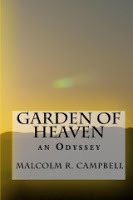 It's easy. Click here and you'll be transported to my Almanac web log where--if you leave a comment--you'll be entered in my Garden of Heaven: an Odyssey give-away.
It's easy. Click here and you'll be transported to my Almanac web log where--if you leave a comment--you'll be entered in my Garden of Heaven: an Odyssey give-away.Garden of Heaven: an Odyssey tells the story of David Ward after first love and a war derail his life again and again.
Excerpts
Jane's laugh is obscured by the sound of a runner's feet. A young woman, almost familiar, explodes in a flash of blue and white through a gap in the hedge and careens into me as startled cedar waxwings take flight. Her arms envelope me as we fall. Pinned beneath her, I awaken by degrees to her body rising and falling along the whole of me like incoming waves on a beach—have we not been together like this before, perhaps dreams—to her warm breath, and to the open front of her white poorboy sweater.
-
Night was settling down over the hazy first lights of the bars and hourly rate hotels along Magsaysay Drive and the razor-sharp edges of Kalaklan Ridge like an old whore.
[image error]David dropped several 25-centavo coins over the railing, heard an explosion of whitewater, heard the laughter and the shouting, 'Salamat, Joe, Salamat.'[image error]He crossed Perimeter Road, ignored the hopeful greetings of the money changers behind their well-caged windows, then dodged a badly mixed throng of sailors, girls and honking multi-coloured jeepneys that swelled out into the Gordon Avenue intersection. He cut across the street, smiling, waving at imagined friends in the distance, and moved with the deliberate intent of a man who had crossed this street hundreds of times.[image error]'Casual alertness, that's the key to surviving Olongapo's jungle of thieves, gangs, girls, high-strung Marines, bored Shore Patrol and Hard Hats, and drunk boatswain's mates and snipes,' Lowell had said.[image error]--Hey Joe, cold beer cold beer cold beer, nice girls.- I'll draw one commenter's name out of a hat on April 1. Plenty of time, but don't forger. Malcolm
Published on February 08, 2011 11:16
February 4, 2011
Creative sparks and the real protagonist
 The main character in a novel or short story is called the protagonist. Within a typical story structure, the protagonist faces a problem or challenge that introduces conflict into his/her life. This conflict and its ultimate resolution are what draw us as readers into the story.
The main character in a novel or short story is called the protagonist. Within a typical story structure, the protagonist faces a problem or challenge that introduces conflict into his/her life. This conflict and its ultimate resolution are what draw us as readers into the story.If the protagonist solves the problem too quickly and/or too easily, the story is usually boring and without sparks. If the protagonist tries multiple times over many pages to solve the problem, readers may drift away from the story unless they see movement in the plot. Again, the sparks have faded. I like literary fiction, so I am generally fairly patient with outcomes that take some time to evolve. But I like to see a purpose in it whether it's a puzzle of a subplot or a shift to another character's view point.
As a reader and as a reviewer, my eyes glaze over when I confront stasis in the work. I am comfortable with long interior monologues, flights of fancy, dreams, descriptions, explorations of place settings, and plots within plots within plots. But the story must move--somehow, somewhere. The spark cannot have gone out.
Stasis is unnatural in nature, yet when we allow it into our own lives it makes us feel stuck, hopeless, powerless, small, depressed and off-line with the world as it is. When I read a short story or a novel that is stuck--as opposed to the protagonist being or feeling stuck--I begin to question the author's state of mind when s/he wrote the material. Was s/he stuck in some way? If so, did his or her feeling of being stuck somehow find its way into the material?
As reader, I often ask that question. It's rhetorical, of course, because authors aren't likely to appreciate e-mails out of nowhere that imply that their own challenges may have extinguished the sparks their stories could have, should have, might have had.
As an author, I try to remain sensitive to the movement of my protagonist throughout the book. I realize that on days when I am stuck, my attitude about the protagonist shifts. I find myself making his or her lot in life more difficult and the chances of success less likely. I try not to write on such days because it spoils the story.
When I write, I feel that "behind the curtain" of my fiction, I am the real protagonist. I am being changed as I write even though the main character in the story may have little or nothing in common with me. When I stop being changed by what I am writing, the story stops being interesting.
That's when I have to step away from the work until I get my personal spark back from wherever I lost it.
-
You may also like:
Review: 'Razor's Revenge' by Paul Chandler
Things That Are Puzzling (where I ask why writers seem to talk more about trivia than writing)
What if all our fiction becomes true? (where I dabble in quantum speculation)
-
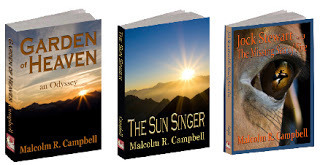 Malcolm R. Campbell is the author of The Sun Singer, Garden of Heaven: an Odyssey, and Jock Stewart and the Missing Sea of Fire.
Malcolm R. Campbell is the author of The Sun Singer, Garden of Heaven: an Odyssey, and Jock Stewart and the Missing Sea of Fire. His work also appears in Forever Friends, Nature's Gifts and 100 Years, 100 Stories.
Published on February 04, 2011 19:22
February 1, 2011
The Day I Sat with Jesus on the Sundeck and a Wind Came Up and Blew My Kimono Open and He Saw My Breasts
 When she was 70, Edmonton, Alberta author Gloria Sawai collected the stories representing a lifetime of work into a spare and magical volume called A Song for Nettie Johnson that holds the beauty of the prairie and the pious, poor, dark, and delightful people who live there "on the margins" within its pages. The book won the Governor General's Literary Award in 2002.
When she was 70, Edmonton, Alberta author Gloria Sawai collected the stories representing a lifetime of work into a spare and magical volume called A Song for Nettie Johnson that holds the beauty of the prairie and the pious, poor, dark, and delightful people who live there "on the margins" within its pages. The book won the Governor General's Literary Award in 2002.Sawai likes the symbolism of stone and grace. Nora Foster Stovel said that the stone suits the "flinty side" of the work and the Governor General's Award said, "The power of grace illuminates her world." Sawai's spartan, plain-spoken use of language may remind some readers of Plainsong by Kent Haruf.
The opening novella from which the collection gets its title, "A Song for Nettie Johnson," begins: From her chair at the edge of the quarry she looks down at the the bottom of the pit--as wide and as long as a garden, as big as a front yard with grass, or the sunny porch of a white mansion far away.
And later, when describing the nearby town: If you were a bird, a large bird say, or better yet an angel, a young angel sent from the north of heaven, and if you were flying south on this day, over the town of Stone Creek, and if your muscles were strong and the sinews of your wings sturdy so you could balance above the town, resisting the winds that could blow you past Regina into Manitoba, and if you were looking down as you paused in your flight, you would see below you a huddle of rugged buildings beside slim and dusty roads.
I find the work stunning, and appreciate its confluence of magic and the natural world. Stovel summarizes the stories well: "Sawai's dedication of A Song for Nettie Johnson to her parents, brothers, and children suggests the core of kinship in this collection. The power and the pain of family, of blood relations, challenge and sustain the acute sensibility of the girl-child as she is initiated into the mysteries of the adult world in such sensitive stories as 'The Ground You Stand On' and 'Hosea's Children.' The cover image, 'Woman Dancing in Meadow' by Gary Isaacs, portrays a woman rooted to the earth but reaching for the sky--an apt symbol for the central consciousness of these stories."
The final story in the book, "The Day I Sat with Jesus on the Sundeck and a Wind Came Up and Blew My Kimono Open and He Saw My Breasts." previously appeared in twelve anthologies. It's not surprising. The title gets one's attention. It has been called blasphemous, and that's nonsense that misses the point and the message and the transcendence of the events of a windy day when Jesus stopped by for a visit.
Speaking of the clarity the world brings to a person during extraordinary events, the protagonist says, You can imagine how distinctly I remember the day Jesus of Nazareth, in person, climbed the hill in our backyard to our house, then up the outside stairs to the sundeck where I was sitting. And how he stayed with me for awhile. You can surely understand how clearly those details rest in my memory.
How matter-of-fact Sawai is in writing about His arrival: First he was a little bump on the far, far-off prairie. Then he was a mole way beyond the quarry. Then a larger animal, a dog, perhaps, moving out there through the grass. Nearing the quarry, he became a person. No doubt about that. A woman, perhaps, still in her bathrobe. But edging out from the rocks, through the weeds, toward the hill, he was clear to me. I knew who he was. I knew that just as I knew the sun was shining.
Reading "A Song for Nettie Johnson" and "Oh Wild Flock, Oh Crimson Sky" and "The Dolphins" and "The Day I Sat with Jesus on the Sundeck and a Wind Came Up and Blew My Kimono Open and He Saw My Breasts" simultaneously anchors a person to the earth as surely as stone while setting him free into the sky as surely as wind and angels.
--Malcolm
Published on February 01, 2011 09:26
January 28, 2011
Quick Sex, Weekend Relationships and Short Books
They came for Middlemarch (904 pp), but I didn't speak up for it because I wasn't a Victorian. Then they came for The Adventures of Augie March (608 pp), and I didn't speak up for it because I heard it was bad for the Jews. Then they came for Ulysses (556 pp), but I didn't speak up for it because I was still pissed off about having to read Finnegans Wake (672 pp) in school. Then they came for A Visit From the Goon Squad, which at 288 pages was suddenly too long, but by then nobody gave a what the what about books at all. -- Barbara Finkelstein: In Defense of Long Books
Barbara Finklestein tries to shame us into reading long books with her "Martin Niemöller guilt card," but it's too late.
Truth be told, the world is searching for one-minute orgasms, weekend relationships and short books. Anything longer requires commitment.
Word on the street is that if you can't get your foreplay done between text messages, your sex is out of hand. Sure,some (fewer every day) remember the good old days when still waters ran deep, but shallow is the new normal whether you're looking at a doctor's appointment, a marriage or psychoanalysis--much less a novel.
Actually, if you can remember the good old days, you're already behind the curve of the nine-minute sound bite, 24-second news cycle and the nanosecond page load. Fast is good because it frees up more time for instant gratification.
Sure, some (fewer every minute) remember the good old days when we understood that "speed kills," but now anything else is too slow a way to die. These days, anything other than fast food is a waste of time, time that can be used for unlimited peak experiences and more input.
Needless to say, if you remember anything that happened prior to 30 minutes ago, you're spending too much time thinking and too little time keeping up with what's happening now. Here we're not speaking of the timeless "eternal now," but the temporal finite now. Even the word "now" has gotten too long.
In our rush, we've given up long books. Used to be, a long book was like a long marriage or sex that lasted all evening. Now, long books require too much commitment. We need to protect ourselves from commitment, that is to say, anything that requires more that a moment of our time. Otherwise, how foolish we are. Who wants to send a text message these days that admits to thirty minutes of anything?
Writers are already worrying about the day when a Tweet is the longest thing in the galaxy anyone will read.
One can't help but applaud an approach to life that offers a constant blank slate. Yesterday is not only irrelevant, it might not have happened. If you remember the uproar that hit the planet when the concept of "Situation Ethics" first came up, suffice it to say you're remembering an illusion. Yet, to forget is to have situation ethics and literature that fits on a cell phone screen and everything else that is the soul of wit.
Here's the important truth and there's no point in whining about it: Anything longer than a brief, shining moment is an eternity outside the boundaries of our attention span.
Malcolm R. Campbell is the author of "Jock Stewart and the Missing Sea of Fire," a satirical novel that you can be reading in less than a New York minute on your Kindle.
Barbara Finklestein tries to shame us into reading long books with her "Martin Niemöller guilt card," but it's too late.
Truth be told, the world is searching for one-minute orgasms, weekend relationships and short books. Anything longer requires commitment.
Word on the street is that if you can't get your foreplay done between text messages, your sex is out of hand. Sure,some (fewer every day) remember the good old days when still waters ran deep, but shallow is the new normal whether you're looking at a doctor's appointment, a marriage or psychoanalysis--much less a novel.
Actually, if you can remember the good old days, you're already behind the curve of the nine-minute sound bite, 24-second news cycle and the nanosecond page load. Fast is good because it frees up more time for instant gratification.
Sure, some (fewer every minute) remember the good old days when we understood that "speed kills," but now anything else is too slow a way to die. These days, anything other than fast food is a waste of time, time that can be used for unlimited peak experiences and more input.
Needless to say, if you remember anything that happened prior to 30 minutes ago, you're spending too much time thinking and too little time keeping up with what's happening now. Here we're not speaking of the timeless "eternal now," but the temporal finite now. Even the word "now" has gotten too long.
In our rush, we've given up long books. Used to be, a long book was like a long marriage or sex that lasted all evening. Now, long books require too much commitment. We need to protect ourselves from commitment, that is to say, anything that requires more that a moment of our time. Otherwise, how foolish we are. Who wants to send a text message these days that admits to thirty minutes of anything?
Writers are already worrying about the day when a Tweet is the longest thing in the galaxy anyone will read.
One can't help but applaud an approach to life that offers a constant blank slate. Yesterday is not only irrelevant, it might not have happened. If you remember the uproar that hit the planet when the concept of "Situation Ethics" first came up, suffice it to say you're remembering an illusion. Yet, to forget is to have situation ethics and literature that fits on a cell phone screen and everything else that is the soul of wit.
Here's the important truth and there's no point in whining about it: Anything longer than a brief, shining moment is an eternity outside the boundaries of our attention span.
Malcolm R. Campbell is the author of "Jock Stewart and the Missing Sea of Fire," a satirical novel that you can be reading in less than a New York minute on your Kindle.
Published on January 28, 2011 13:47
January 26, 2011
'Garden of Heaven' paperback price reduced 20%
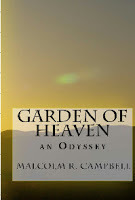 Paperback EditionI'm happy to announce that the retail price for the paperback edition of my novel Garden of Heaven: an Odyssey has been reduced by 20%. You will find the book on Amazon for $18.75.
Paperback EditionI'm happy to announce that the retail price for the paperback edition of my novel Garden of Heaven: an Odyssey has been reduced by 20%. You will find the book on Amazon for $18.75.Vanilla Heart Publishing's PDF-format edition of the novel is available on OmniLit for $5.99.
Garden on Heaven: an Odyssey is a hero's journey novel about a man those first love was almost his last. You can learn more about the novel on its website and read an excerpt from the novel on fReado.
Publisher's Description
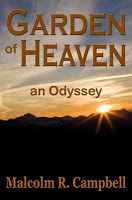 Electronic EditionWhen nineteen-year-old David Ward climbs the sacred mountain Ninaistuko seeking a vision, the golden eagle of earth flings him back onto the prairie and the black horse of dreams shows him the future. Though his eyes are opened, fate hides exactly what he needs to know.
Electronic EditionWhen nineteen-year-old David Ward climbs the sacred mountain Ninaistuko seeking a vision, the golden eagle of earth flings him back onto the prairie and the black horse of dreams shows him the future. Though his eyes are opened, fate hides exactly what he needs to know.David has grown up on a Montana sheep ranch where bluebunch wheatgrass and rough fescue have long served, where the sky detests fences, where the seasons are task masters, where predators and gods strip the impractical from the bone.
As life draws him away, he leaves with powerful lessons learned from his grandparents. Jayee, his utilitarian railroad man grandfather, has taught him the language of the plains. Katoya, his mystical Blackfeet grandmother, has taught him the language of the mountains. He soon loses his fluency in both.
He meets his first love amongst Indian paintbrush and larkspurs in the high-country of the Garden of Heaven and then becomes separated from her on the far side of Florida's Crooked River in Tate's Hell Swamp. His life shatters into a kaleidoscopic puzzle.
David begins finding the widely scattered pieces at the summit of Chogori, the world's most difficult mountain, and on an aircraft carrier deployed to the Western Pacific during the Vietnam War. Others lie upside down in Chicago, Hawai'i, the Philippines and the Netherlands.
After he lands a teaching job at a small college in central Illinois, he suspects he was conjured there by a woman standing in the moonlight on Moon Hill. Siobhan, the wise woman in his life tells he will never understand what has happened to him until he can answer the question: "who tried to kill me and why?"
As a "light-dancer," he remembers well the alchemists' guiding principle: "By fire is nature renewed whole." He suspects all paths lead to that point.
Malcolm R. Campbell is also the author of "The Sun Singer" and "Jock Stewart and the Missing Sea of Fire," both of which are available on Kindle and in paperback.
Published on January 26, 2011 11:44
January 20, 2011
The Soul of a Great Book
"Every book, every volume you see here, has a soul. The soul of the person who wrote it and of those who read it and lived and dreamed with it. Every time a book changes hands, every time someone runs his eyes down its pages, its spirit grows and strengthens." -- Carlos Ruiz Zafón in "The Shadow of the Wind"
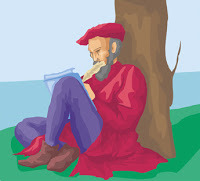 The Shadow of the Wind had everything in it I look for in a book: magic, an intricate plot, multiple intrigues, and stakes that kept going up as I turned each page.
The Shadow of the Wind had everything in it I look for in a book: magic, an intricate plot, multiple intrigues, and stakes that kept going up as I turned each page.
Of the novel, Booklist wrote, "Part detective story, part boy's adventure, part romance, fantasy, and Gothic horror, the intricate plot is urged on by extravagant foreshadowing and nail-nibbling tension. This is rich, lavish storytelling, very much in the tradition of Ross King's Ex Libris (2001)."
I will re-read the book again and again for that rich and lavish storytelling as well as its the detective story. But it stays with me primarily because of its themes, one being that every book has a soul that begins with the author and expands as readers pick up the novel and read it. We smile at this, I suppose, seeing a bit of quaint animism in the notion.
Perhaps soul isn't a word we're comfortable with here. Perhaps influence is better, an influence that grows over time so that we begin to see the characters and settings as actual, as having happened in another time or place, or perhaps yet to happen, but more real even than the people we meet on the street or those who live next door an invite us over for beer and barbecue and then leave the TV on so that we know their food and their tastes in entertainment and then go home seeing them as very finite compared to, say, Rhett Butler or Scarlett O'Hara or Harry Potter or Elmer Gantry.
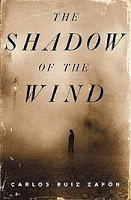 As people read, books often become larger than life, so much larger than the characters and plot that first began taking shape inside an author's head, so much larger than "a book about a school of wizardry" or a book about "a carefree boy growing up along the Mississippi River." The story grows as others read it, think about it, fantasize about the events and characters in it, and then go talk to their friends about it and wonder whether there will be a sequel or a movie version coming soon. All of this transcends advertising and buzz and hype, for once all that is gone, each of us sits alone in our quiet moments with the book in our hands, and there we drink in the words and they change us at the very same moment our association with the book is changing the book.
As people read, books often become larger than life, so much larger than the characters and plot that first began taking shape inside an author's head, so much larger than "a book about a school of wizardry" or a book about "a carefree boy growing up along the Mississippi River." The story grows as others read it, think about it, fantasize about the events and characters in it, and then go talk to their friends about it and wonder whether there will be a sequel or a movie version coming soon. All of this transcends advertising and buzz and hype, for once all that is gone, each of us sits alone in our quiet moments with the book in our hands, and there we drink in the words and they change us at the very same moment our association with the book is changing the book.
Soul and spirit and influence don't quite cover what is happening here, but what a marvelous interchange of realities and dreams comes to us from "Once upon a time" and all that follows.
-
--Malcolm R. Campbell is the author of Garden of Heaven , a hero's journey novel about heaven, hell, love, and war and the differences between them.


 The Shadow of the Wind had everything in it I look for in a book: magic, an intricate plot, multiple intrigues, and stakes that kept going up as I turned each page.
The Shadow of the Wind had everything in it I look for in a book: magic, an intricate plot, multiple intrigues, and stakes that kept going up as I turned each page.Of the novel, Booklist wrote, "Part detective story, part boy's adventure, part romance, fantasy, and Gothic horror, the intricate plot is urged on by extravagant foreshadowing and nail-nibbling tension. This is rich, lavish storytelling, very much in the tradition of Ross King's Ex Libris (2001)."
I will re-read the book again and again for that rich and lavish storytelling as well as its the detective story. But it stays with me primarily because of its themes, one being that every book has a soul that begins with the author and expands as readers pick up the novel and read it. We smile at this, I suppose, seeing a bit of quaint animism in the notion.
Perhaps soul isn't a word we're comfortable with here. Perhaps influence is better, an influence that grows over time so that we begin to see the characters and settings as actual, as having happened in another time or place, or perhaps yet to happen, but more real even than the people we meet on the street or those who live next door an invite us over for beer and barbecue and then leave the TV on so that we know their food and their tastes in entertainment and then go home seeing them as very finite compared to, say, Rhett Butler or Scarlett O'Hara or Harry Potter or Elmer Gantry.
 As people read, books often become larger than life, so much larger than the characters and plot that first began taking shape inside an author's head, so much larger than "a book about a school of wizardry" or a book about "a carefree boy growing up along the Mississippi River." The story grows as others read it, think about it, fantasize about the events and characters in it, and then go talk to their friends about it and wonder whether there will be a sequel or a movie version coming soon. All of this transcends advertising and buzz and hype, for once all that is gone, each of us sits alone in our quiet moments with the book in our hands, and there we drink in the words and they change us at the very same moment our association with the book is changing the book.
As people read, books often become larger than life, so much larger than the characters and plot that first began taking shape inside an author's head, so much larger than "a book about a school of wizardry" or a book about "a carefree boy growing up along the Mississippi River." The story grows as others read it, think about it, fantasize about the events and characters in it, and then go talk to their friends about it and wonder whether there will be a sequel or a movie version coming soon. All of this transcends advertising and buzz and hype, for once all that is gone, each of us sits alone in our quiet moments with the book in our hands, and there we drink in the words and they change us at the very same moment our association with the book is changing the book.Soul and spirit and influence don't quite cover what is happening here, but what a marvelous interchange of realities and dreams comes to us from "Once upon a time" and all that follows.
-
--Malcolm R. Campbell is the author of Garden of Heaven , a hero's journey novel about heaven, hell, love, and war and the differences between them.

Published on January 20, 2011 12:09
January 17, 2011
Novelist and Shaman
 When I compare sources describing the shaman's journey and the novelist's journey, I see similarities. Both begin their journey's by relaxing, setting aside distracting thoughts, calming themselves and using their imaginations as the catalyst for the trip that follows. In both cases, the imagination begins the journey, but isn't the journey itself.
When I compare sources describing the shaman's journey and the novelist's journey, I see similarities. Both begin their journey's by relaxing, setting aside distracting thoughts, calming themselves and using their imaginations as the catalyst for the trip that follows. In both cases, the imagination begins the journey, but isn't the journey itself.Information--whether visual, heard, or sensed--comes to both the shaman and the novelist through motifs and symbols they know and are used to interpreting. During their training, both are urged to journey with intent but with a nonjudgemental attitude. Listen, pay attention, remember and record what happens.
Like the shaman, the novelist often goes through preparatory rituals. In both cases, these serve the same function: they facilitate, empower and honor the trip. The shaman may keep a feather close at hand and ride down to a theta brainwave frequency on the beat of a drum, and that journey may always begin with a nonphysical point of departure such as a meadow or an old log or a camp fire. The novelist may work in a room with meaningful photographs and artwork, and ride into the otherworld of the story s/he is telling on thye ticking of a clock or the play of light through the window or music for the moment.
 My point of departure in either mode is an "imaginary cabin" in a real valley in Glacier National Park. Those who meditate, whatever their intent, often visualize their departure points as relaxing beaches, meadows, lakes and mountain tops. Once there, the imagination backs away and the journeying, listening, or healing begins.
My point of departure in either mode is an "imaginary cabin" in a real valley in Glacier National Park. Those who meditate, whatever their intent, often visualize their departure points as relaxing beaches, meadows, lakes and mountain tops. Once there, the imagination backs away and the journeying, listening, or healing begins.I placed my "imaginary cabin" in a placed I'd physically traveled to many times. It's also a location that has been captured in many photographs, so I see the valley in nearby pictures before I see it in my mind's eye.I have been using this cabin for meditation for almost 40 years. Over time, it's taken on all the comforts of home. At the beginning, I relied on longer relaxation techniques to "get there." Now, I can "be there" in an instant.
My journeys overlap. That is to say, there are few boundaries between a shamanic journey and a writing journey, for in both cases, I am soaking up information and inspiration. My novels The Sun Singer and Garden of Heaven both mention this cabin. Sarabande, my novel in progress, also mentions it. While readers know what the cabin looks like from the descriptions in my books, I think an intuitive shaman or psychic could probably find the cabin in nonordinary reality and see that it is no less real than the lake it sits beside.
If you write, you probably have your own rituals, techniques, and processes. Maybe you puzzle together your first drafts the way a carpenter builds a cabinet or may you type very rapidly and just let the story flow out across the page or the screen. While I like the "power" of all the comfortable objects that resemble clutter to everyone else, you may prefer a clean desk and a room with a minimal number of photographs or art works. We each do what works for us. But, should you tell me that there are times when your characters talk to you when you're not even at work and/or that when you are writing, your characters do and say unexpected things, then I'm going to smile and see that there is some journeying in your approach.
Like a shaman, the novelist, composer or artist at work has an opportunity to learn much that s/he did not previous know just from going through the process of creation. In some ways, the book, song or painting that may occasionally result is a byproduct of what is really unfolding.
--Malcolm
Published on January 17, 2011 19:28
January 14, 2011
Contemplating the News Value of Paris Hilton's Butt
Skimming through back issues of the online NYDailyNews, one sees that editors considered Paris Hilton's ass newsworthy in Oops! Paris Hilton reveals full moon in sheer leggings disaster just two scant days before Thanksgiving last year.
Frankly, even my fictional reporter Jock Stewart won't stoop this low.
Considering standards, let's stipulate that the ass report was probably timely. That is, unlike this post, the story was filed right after the ass appeared.
News should also be real. Here, I have no way to judge any more than I can judge the nearby story, "Whoa! Kim Kardashian flaunts her famous assets." In this case, the assets weren't an ass. But reality is a relative thing: you decide.
Looking at news as a story of an idea, event or problem, I don't know whether the assets or the ass were a problem, much less an idea. But, like "Heidi Montag suffers major wardrobe malfunction in Costa Rica while swimming in tiny bikini" we presume the revealing moments were actual events.
It is said that news interests people. Putting these stories in the same "interests people" bucket as car wrecks on the road, they are a feast for unapologetic gapers. "Jaw dropping," is a term we often hear.
For news to be news, it must be either near or big. Little events far away seldom attract our attention, while big ones do. Objects in a gossip reporter's field of vision may, like things seen in rear view mirrors, may be closer than they appear. This concept must apply to butts and bosoms.
While the Hilton report probably didn't cause gossip columnist Walter Winchell to turn over in his grave, I can't help but think that Edward R. Murrow and Ernie Pyle would say that even though the ass in question involves the words "Paris" and "Hilton," it's not all its cracked up to be.
Malcolm R. Campbell is the author of Jock Stewart and the Missing Sea of Fire and the Morning Satirical News web log.

Frankly, even my fictional reporter Jock Stewart won't stoop this low.
Considering standards, let's stipulate that the ass report was probably timely. That is, unlike this post, the story was filed right after the ass appeared.
News should also be real. Here, I have no way to judge any more than I can judge the nearby story, "Whoa! Kim Kardashian flaunts her famous assets." In this case, the assets weren't an ass. But reality is a relative thing: you decide.
Looking at news as a story of an idea, event or problem, I don't know whether the assets or the ass were a problem, much less an idea. But, like "Heidi Montag suffers major wardrobe malfunction in Costa Rica while swimming in tiny bikini" we presume the revealing moments were actual events.
It is said that news interests people. Putting these stories in the same "interests people" bucket as car wrecks on the road, they are a feast for unapologetic gapers. "Jaw dropping," is a term we often hear.
For news to be news, it must be either near or big. Little events far away seldom attract our attention, while big ones do. Objects in a gossip reporter's field of vision may, like things seen in rear view mirrors, may be closer than they appear. This concept must apply to butts and bosoms.
While the Hilton report probably didn't cause gossip columnist Walter Winchell to turn over in his grave, I can't help but think that Edward R. Murrow and Ernie Pyle would say that even though the ass in question involves the words "Paris" and "Hilton," it's not all its cracked up to be.
Malcolm R. Campbell is the author of Jock Stewart and the Missing Sea of Fire and the Morning Satirical News web log.
Published on January 14, 2011 18:53
January 10, 2011
Southern Snow Keeps Many People at Home
 Here in the south--Jackson County Georgia, to be specific--six or seven inches of snow means schools are closed, many businesses are closed, and (apparently) even the post office shuts down neighborhood delivery. The kids have a field day while mom and dad try to run the house with extra people in it.
Here in the south--Jackson County Georgia, to be specific--six or seven inches of snow means schools are closed, many businesses are closed, and (apparently) even the post office shuts down neighborhood delivery. The kids have a field day while mom and dad try to run the house with extra people in it.Since our cats don't go to school, my wife and I don't have extra work when it snows. Some things, like Monday morning grocery shopping get postponed. With the freezing drizzle on top of the snow, we might not even take the cars out tomorrow.
When I lived in Waukegan, Illinois, I had a one-hour commute to work under the best of conditions. When it snowed, we were still expected to be there regardless of how long it took. Woe be unto the person who claimed they were snowed in when people were already at the office from the more rural areas that saw fewer snow ploughs.
I look at our cars sitting here in the driveway, and get a bit of a guilty feeling about it. If I still lived in northern Illinois, I'd be brushing all that snow off, shoveling the driveway as needed, and driving some forty miles to work. Jackson County gets measurable snow so infrequently in spite of our Christmas snow last year, that none of us are expected to go anywhere or do anything other than talk about the weather.
--Malcolm
Published on January 10, 2011 14:20
January 7, 2011
My eyes glaze over when I read about optimizing web sites
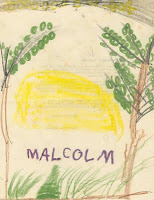 If you ever write a post about optimizing web sites, I'm not going to read it. Why? Well, frankly, I see so many posts like this that after a while they become more platitudinous noise in the environment like posts reminding us to stay hydrated while jogging or to brush our teeth before we go to bed.
If you ever write a post about optimizing web sites, I'm not going to read it. Why? Well, frankly, I see so many posts like this that after a while they become more platitudinous noise in the environment like posts reminding us to stay hydrated while jogging or to brush our teeth before we go to bed.So, I will not describe here my time and effort this week to update my Garden of Heaven web site so that more people will find it, read a little here and a little there and then buy the novel. My intent was to splash more of my passions around the site and hope that others with those passions might enjoy reading about them in my fiction.
For me, all of this answers the question: what drives you? What do you like, what do you write about, and might people with similar feelings and likes be drawn to your fiction? If you like this question, you can read my post about it here: Authors, What Drives You?
Glacier National Park
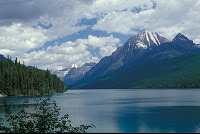 My passions include Montana, mountains and hero's journey stories. Since Garden of Heaven and The Sun Singer are both hero's journey novels set partly in Glacier National Park, I added more Glacier information on my web site. If you're passionate about Glacier National Park and/or are thinking about becoming passionate about it, you might enjoy another of my historical posts about it here: All Aboard for Glacier National Park.
My passions include Montana, mountains and hero's journey stories. Since Garden of Heaven and The Sun Singer are both hero's journey novels set partly in Glacier National Park, I added more Glacier information on my web site. If you're passionate about Glacier National Park and/or are thinking about becoming passionate about it, you might enjoy another of my historical posts about it here: All Aboard for Glacier National Park.Screwing Mark Twain
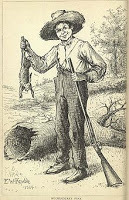 The misguided people in charge of NewSouth Books believe they are helping literature and/or today's school children by removing the word "nigger" from Huckleberry Finn and replacing it with the word "slave." They claim they are simply finding a new way to express the truth. The truth about the days when Twain's characters lived and breathed is what they lived and breathed. One of those things was the word "nigger."
The misguided people in charge of NewSouth Books believe they are helping literature and/or today's school children by removing the word "nigger" from Huckleberry Finn and replacing it with the word "slave." They claim they are simply finding a new way to express the truth. The truth about the days when Twain's characters lived and breathed is what they lived and breathed. One of those things was the word "nigger."Those who want to "update literature" are doing authors a great disservice. Worse yet, they are doing today's readers a great disservice. The New York Times article about the screwing of Mark Twain is here. Author Lee Libro has a wonderful post about it here. I take a more indirect approach by writing satire about it here where a fictional book publisher issues a "cleaned up" biography of Harriet Tubman without the pejorative word "slave" in it.
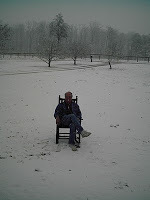 Another Snowy Weekend
Another Snowy WeekendWe had snow in northeast Georgia for Christmas. Now, weather forecasters are telling us we're going to have even more snow this coming weekend.Maybe five inches.
Atlanta and the towns to the north of it tend to be overly anxious about snow, so this weather report may be making a blizzard out of a few random flakes.Better safe than sorry, we say, especially those of us who remember the "Snow Jam" of 1982 and the very real blizzard of 1993.
If so, it will be a good time to stay inside and read--after throwing a few snowballs, of course.
--Malcolm
Published on January 07, 2011 19:33



